#irish diaspora
Text
In which I try not to be That Guy TM when it comes to Irish ancestors: An exploration of ancestry, diaspora and culture
Because of The Horrors TM in my life atm I've been looking into my biological family tree. I'm adopted but estranged from my adoptive family and I never met my biological family since I was adopted just short of my 2nd birthday. I've been tracing my ancestry for about 3 years now and it's genuinely quite stress relieving to me. It's also fun and challenging from a research standpoint - putting together my own family tree gave me the skills to write articles like this one I wrote in 2022 about historical Welsh queer people, for example.
Lately, I've been finding out more about my Irish ancestors while an adoptee (and thus not knowing any of my biological family) - but also doing this as a Celticist and tired of people doing the 'my sister's friend's cousin's father's mother was Irish' thing. This has created an almost unbearable tension between curiosity at my own ancestry while trying not to be That Guy who finds out about one (1) Irish ancestor hundreds of years ago and is weird about it.
Especially since mine are quite distant ancestors - my great, great, great grandparents were born in Dublin and in a tiny village in County Down called Dunnaman (near Kilkeel). However, they were Irish Catholics and emigrated to Liverpool in the 1870s - all of their subsequent children and grandchildren were born in Liverpool and all of the above + great grandchildren were raised Catholic - including my grandmother (who died before I was born). So there was an obvious attempt to maintain that heritage. There's even evidence my great, great, great grandmother at least spoke Irish (which, as she was born in County Down, would have been Ulster Irish).
The problems with uncritically throwing oneself at an ancestor's nationality:
Now, not all North Americans of Irish (or Welsh, Scottish, Italian, Scandinavian, German etc.) descent do this - but there's a very vocal set of North Americans of Irish descent who find awe and interest in their ancestry - which is actually quite a positive thing! - however, due to either temporal or cultural disconnect, they may end up doing or saying things (and not necessarily with bad intentions) which can have a negative impact on the Irish and the Irish language (or [nationality] and [language(s) associated with that nationality].
I'm reminded of the time an American commented on a Welsh language rights post I made in support of Welsh speakers, but they accidentally ended up using a white nationalist slogan by mistake. It can be a minefield - and with regards to Ireland specifically, mistakes like that can be so much worse. To literally give my own (mild) example, today I decided to relearn Irish (since I haven't spoken any in years since being taught basics at undergrad) and picked up a blank notebook I bought at Tesco the other week, while completely forgetting the inside cover of the notebook was orange. I was planning on decorating the notebook anyway and painted it a different colour. While I know that nobody would really hold it against me if I didn't change the colour, I just know that walking around with an orange notebook filled with Irish I'm relearning because of interest in my Catholic ancestors could be a confusing set of messages, at the very least. If you don't understand why this is, look up the meanings of the colours on the flag of Ireland.
Which is to say, even those of us in Northern Europe who have significantly greater physical proximity to Ireland than North America (and therefore should know better) still can and do get things wrong. And not just benignly wrong like in my case.
The tendency for some North Americans of Irish descent (Canada isn't exempt from this) to conflate Irish ancestry with a contemporary connection to the modern countries located on the island of Ireland as a whole can have results ranging from 'a bit weird' to 'jesus fucking christ'. As a Celticist, I've seen far, far too many Americans of Irish descent try to weigh in on modern Irish politics without any background knowledge or tact at all - and naturally they stake their claim on modern Irish politics entirely on the premise of having distant Irish ancestors. Or, even worse, things start to get all phrenological.
'Irish blood' and the nonexistence thereof:
'Irish blood' is continually evoked by some to validate their sense of 'Irishness' and the obsession with '[insert nationality] blood' is a distinctly North American phenomenon- likely related to or an offshoot of the concept of 'blood quantum', in which enrolment into some Native American nations and tribes is determined by how much 'Native blood' a person has. Notably, many people who would ostensibly have been described under this system as 'full blood' were registered by the US as 'half blood'. This is a method of genocide intended to wipe out tribes and nations by imposing strict measures of who does or does not qualify to enrol into a tribe or nation. This concept seems to have been extrapolated over time (in a North American context at least) into the idea of descent from other nationalities' being measured in a similar or adjacent way. This is how you end up with some North Americans declaring they are '1/8 Italian and 1/4 Irish' on their dad's side etc. While in Europe (where these nationalities hail from, crucially) this practice is seen as a really weird way to describe your ancestry. In general, it's simply 'my 4 times grandfather came from Spain' or 'my great great grandfather on my dad's side came from Finland' etc. if it comes up at all. For various political reasons, many Europeans with descent from multiple other European nationalities may choose to omit to mention descent from certain nationalities, especially if in recent history there has been conflict between their birth nation and an ancestor's nation. The most famous example of this is literally the British royal family changing their surname from the German Saxe-Coburg and Gotha to the more 'British sounding' Windsor in 1917 due to the onset of the First World War.
Where it gets really weird (and also very offensive and rude) is when cultural stereotypes get invoked alongside the whole 'blood' thing in usually quite damaging and/or disparaging ways. I've seen way too many North Americans of Irish descent claim they're alcoholics because they have 'Irish blood' or even worse, claim it's normal to domestically abuse their spouses because of it!! (Genuine thing I have seen btw). Same goes for claiming to be a naturally good chef because of 'Italian blood' and so on. As a general rule, people from the place where your ancestors were from don't generally like to be inherently be considered drunks or prone to violence due to their nationality. Or have weird and inaccurate idealisms projected onto their language or cuisine.
Aren't there any positives?
It wouldn't be fair to make a post like this without mentioning some of the positives that can come from interest in an Irish ancestor. Like I mentioned at the start of this post, I myself felt inspired to relearn Irish because of my own Irish ancestors. I was taught the Connacht dialect at undergrad, however, since my ancestor was from County Down, I'm going to try and learn Ulster Irish instead. One doesn't need Irish ancestors to learn Irish of course - when I learned I wasn't aware I had any Irish ancestors. But being inspired to learn Irish because of an ancestor can't hurt and directly increases the number of Irish speakers in the world (provided you keep at it). This is a net positive for the language as a whole.
Similarly, people who have educated themselves on Irish politics because of their ancestry and genuinely learned something are also a positive thing to come out of discovering Irish ancestors. In my experience, these people are the kind of people I enjoy talking to about being a Celticist because they actively want to learn and respect the cultures being talked about. Which is huge to me!
Conclusion:
As a Welsh speaker whose national identity is more-or-less Jan Morris-esque, my Irish ancestry is an interesting facet of my ancestry I simply didn't know about before. And being an adopted person, I can sympathise with the general sentiment of a lot of white North Americans of feeling disconnected or alienated from any ancestral heritage. The conditions which create That Guy TM as described above rely on that sense of alienation to propagate a very ineffective, tactless and often very insensitive approach to Irish and other European cultures. But the important thing is that that approach can be challenged by people genuinely interested in their ancestry who are also conscientious of the living versions of the cultures their ancestors hailed from.
For me, that means learning Irish in a dialect my ancestors are likely to have spoken. I also visited the library today to check out some books on the Irish emigration to England and the sociopolitical reasons behind that emigration. I know the broad strokes, but the details are desirable to know to get a better idea of the why and how the country of my birth had a hand in creating the conditions which led my ancestors to emigrate in the first place. I think the world would be a better place if people took the time to understand the history and politics of ancestors which don't share their nationality.
As always, reblogs and thoughts are welcomed and encouraged!
Thank you for reading to the end - and if you'd like to support me, please see my pinned post. Diolch!
#long post#Ireland#Irish#Gaelige#Celtic Studies#Celticist#Irish diaspora#Irish americans#blood quantum cw#racism cw#(just in case)#ancestry#geneology#family history#I've probably made typos but it's 11:40pm and I need to go to sleep
49 notes
·
View notes
Text
as an Irish (we don’t call it “Gaelic”, ever) speaker and a Sunny fan, I thought it would be fun to do a bit of a post about the Irish-language scene in The Gang’s Still in Ireland, because it’s not a scene I see widely discussed but I adore it.
some background. I am not a native Gaeilgeoir (Irish speaker) — my first language is English — but I started learning it age five and have always had very high grades in it and a huge love for it. I was hugely excited about Charlie Kelly being able to read Irish in the previous episode, and even more so when he turned out to be able to speak it.
Colm Meaney, the actor who plays Shelley Kelly, grew up in Ireland and as such would have learned Irish throughout his time in school. (this has been required by law more or less since Irish independence, and it was already quite common before that. nowadays, you can get exemptions for things like dyslexia but otherwise you have to do it.) this is clear in his ease with the language. (I will do a post about where in Ireland Shelley lives at some point, because there aren’t many areas where Irish is the principal language, but that is for another day!) both the actor and the character have easy and good Irish.
Charlie Day, as an Italian-American, obviously does not actually speak the language and presumably learned the lines as a bunch of gibberish sounds. (nonetheless, some of his pronunciations do suggest he had the words written down non-phonetically too.) his delivery of the lines is god damn amazing. Charlie Kelly’s Irish is not remotely American-accented. if I heard someone speaking Irish like that, I’d assume they sounded Irish when speaking English. he doesn’t even sound neutral in Irish; he does actively have an accent (the word choices are more non-regional, not pointing to any of the three distinct dialects, but this makes sense as the same is true of Shelley’s Irish). his pronunciation is so on point and his accent is seriously just a delight to listen to. that’s serious effort to have been put in by an American in a show that routinely makes fun of Irish-Americans! I cannot stress enough how cool it is to see my national language like this and how good a job he does.
as a side note, Charlie Kelly finding Irish much easier to read than English makes total sense! he clearly has dyslexia, as well as intellectual disabilities and autism, so literacy being tricky is totally fair, but is probably being made worse in English by how much of a god damn ridiculous illogical irregular mess the language is. English has around two hundred irregular verbs, and that’s before we even begin to consider the irregularity of its spelling. Irish has eleven irregular verbs, multiple of which are only irregular in one tense. its spelling is entirely consistent and, once the rules are known, any word (pretty much) can be flawlessly pronounced from reading it or flawlessly spelled from hearing it. (I promise Irish names make sense. just not if you try to use English rules on them. the languages are very different!) Irish is one of the most regular languages out there.
so, I thought I’d go through the actual scene. I’m going to put each line, the direct translation, the subtitle provided, and a comment. hopefully this will be interesting to someone other than me!
·—·
“is mise do pheannchara, a Charlie.” (Shelley)
direct translation: “I’m your pen pal, Charlie.”
subtitle provided: “I’m your pen pal, Charlie.”
okay, so they translate “pen pal” two different ways in this scene. the first, used here, is “peannchara”. this is a compound word, much like all those long words you get in German. it’s a perfectly good choice given there is no one standard choice for translating that concept.
“tá brón orm, ach ní thuigim cad atá ráite agat. is féidir liom gibberish a léamh, ach ní féidir liom í a labhairt.” (Charlie)
direct translation: “I’m sorry, but I don’t understand what you’ve said. I’m able to read gibberish, but I’m not able to speak it.”
subtitle provided: “I’m sorry. I don’t understand what you just said. I read gibberish, but I don’t speak it.”
I would slightly disagree with the subtitles here. the “just” bit isn’t expressed at all. in fact, there is no Irish equivalent to that word, and we often just use the English one in the middle of an Irish sentence because of this. however, I expect that RCG (Rob McElhenney, Charlie Day, Glenn Howerton) wrote the subtitles and then handed them to an Irish translator, in which case the translator did a perfectly good job. a couple of notes about the use of “gibberish” here. I love it. firstly, we totally do drop English words into sentences like that. secondly, I really like the choice to use the feminine form of “it” here (that is, to make “gibberish” a feminine noun). all languages except English are feminine nouns in Irish as a rule, so it’s just a lovely detail calling back to the fact that Charlie thinks of it as the gibberish language. also, Charlie Day really does absolutely nail that voiceless velar fricative (the consonant sound in “ach”, as in Scottish “loch” or any number of German words), a sound even many natively English-speaking Irish people are lazy about. good on him.
“níl aon ciall le sin. sé á labhairt anois!” (Shelley)
direct translation: “there’s no sense to that. it’s being spoken now!”
subtitle provided: “that doesn’t make any sense. you’re speaking it now!”
I adore the phrasing of the first sentence here. thoroughly authentic. there are much more obvious ways to phrase it, but this is absolutely what a native speaker might go with. same goes for the second, actually. Colm Meaney says the second line in a sort of shortened way (same idea as how we might turn “do not” into “don’t”) so I’ve struggled slightly with how to directly translate it. interestingly, Shelley categorises “gibberish” as a masculine noun here, but this isn’t really wrong since it doesn’t have an official grammatical gender due to not being an actual Irish word. just a little odd. also, to fit better to the subtitle of the second sentence, I personally would’ve gone with “tá sé á labhairt agat anois” rather than “tá sé á labhairt anois” (the full version of what Shelley says), as this includes the information of by whom it is being spoken.
“’s é mo dheartháir mo chara pinn.” (Charlie)
direct translation: “it’s my brother that’s my pen pal.”
subtitle provided: “but my pen pal is my brother.”
firstly, to be clear, the nuance of the sentence structure here is not captured in either of the above translations because there simply is not an English equivalent to it. secondly, Charlie uses a contraction here by shortening “is é mo dheartháir mo chara pinn”. super cool. also, there’s that other translation of “pen pal”! this one is “cara pinn”, which uses the Irish genitive case (the word mutates instead of using an equivalent of the English word “of”; this case also exists in other languages including Swedish, German, Latin, and Greek). I like this translation very much too. both work! Charlie Day again delivers this line really nicely, even stressing the word for “brother” (and pronouncing its initial consonant mutation absolutely gorgeously)! I am truly very impressed.
“níl aon fhírinne le sin, a mhic. ’s é do chara pinn… d’athair.” (Shelley)
direct translation: “there’s no truth to that, son. it’s your pen pal who is… your father.”
subtitle given: “no son. your pen pal is your… father.”
so, I really disagree with the first sentence of the subtitles here. it works, but also misses a lot of the beautiful nuance that could have been got. I would have gone with “that’s not true, son” or, more likely, “that’s not right, son”. I also disagree with the placement of the ellipsis in the second sentence, as you see (and my frustrations in translating this sentence structure to English continue, as well). however I like the use of “a mhic” (“son”) here, very much. this is a mutated form of “mac”, meaning “son” (yes, as in all of those Irish surnames; they all just basically say who the person is the son of). it carries both meanings that exist in English: an actual son, but also the use of the word as an affectionate way to refer to any man younger than the (usually male) speaker. this is a really nice choice.
·—·
so, yeah! those are my thoughts. feel free to ask any questions you like. I love this scene so much. as well as the reasons above about how good the translation and delivery is, I also love two other main things about this.
firstly, the level of dignity given to the language. Sunny makes fun of Irish-Americans all the time, but doesn’t really do the same to Irish people from Ireland, which I like (I do also wanna talk about Mac and Charlie as members of the Irish diaspora because it is so so interesting, but that is for another day). Irish as a language is not often given dignity, especially in American or English media, so I really love that it isn’t the butt of the joke here.
secondly, that such a significant scene is delivered through this language. just wonderful. after fourteen and a half series, we finally discover the biological father, and the scene cannot be separated from this beautiful language. it just is so perfect.
RCG, and of course Charlie Day in particular, we Gaeilgeoirí (Irish speakers) thank you! our little language made it to the screens of so many people around the world.
I hope this was interesting haha.
·—·
edits: fixed some things I mistyped.
#always sunny#iasip#sunny#it’s always sunny in philadelphia#irish#gaeilge#irish language#charlie kelly#charlie day#colm meaney#rob mcelhenney#glenn howerton#megan ganz#rcg#ireland#irish diaspora
450 notes
·
View notes
Text
Bless your heart. No - really
It seems to be understood, at least through the southern US, that "bless his/her/your heart" is a thinly veiled insult. However, when I was growing up, technically southern, my mother always used it more literally. F'rinstance, if I took her flowers she might say "Oh, bless your heart" and would 100% mean it. Based on that example, I use it the same way. I've wondered a little about that, since I realized how other people mean it.
Anyhow. I posted a scan of a letter from my great grandmother (daughter of Irish immigrants on both sides) to my grandmother dated 1944. At the end of that she refers to a Valentine's card that my very young mother had sent to her, and added "Bless her heart." Clearly meaning it sincerely. It made me wonder if the southern Bless-your-heart met up with the Irish diaspora tendency to use the term 'Bless' frequently and literally and created a little coal-mining-town pocket of folks who say it when they're truly delighted with someone or something.
Just pondering. Anyone else out there use B-y-h in a positive, loving way? Is Bless-your-heart George's Creek* an outlier that should not be counted?
'* George's Creek follows a major Appalachian coal seam and has lots of tiny, defunct mining towns.
71 notes
·
View notes
Text
ykno a century was a long time ago but given that 3-4 generations in a family usually have contact with each other, in the context of family history, it really isn't that long ago. for example, i knew my great-grandmother (born in 1919). i was young when she died, but old enough to remember her death clearly. i remember how much her absence was felt, since she was the matriarch, and i know she encouraged my art. and she knew her grandmother, born in Ireland close after an Gorta Mór.
that's 7 generations, connected within 3 degrees of separation. i can only imagine how much was lost in that time, and how much was passed on. did my 3rd great grandmother love art like me? what did she go through? how did the experiences of her parents and family impact her, and how does that trickle down to me? i may never know but. it's something that makes me feel more connected and significant to humanity to think about.
even if you never have children yourself, you can undoubtedly experience this connection too. just think about all the people who fought for your rights, all the people who had passion for something you love and developed it greatly. all the people in your day to day life who add a spark to your day, the friends who have helped you grown. we may all turn to dust one day, but your presence will hold for centuries whether you - or anyone alive then - knows it or not.
#julian rants#genealogy#family history#ancestry#ireland#irish diaspora#irish history#humanity#hopepunk#hope#community#reasons to live
113 notes
·
View notes
Text
to anyone with ancestors who survived An Gorta Mór (The Great Famine, who also has a binging/restricting eating disorder... i can guarantee you, there has got to be at least one person in your lineage who would be happy to see you eat well. your ancestors who starved, who had to see their loved ones get sick or die... they would be happy to see you healthy, and deeply saddened to see you in this pain - yes, even if you're fat. especially if you're fat.
if you don't have it in you to eat for your own wellbeing... i hope that maybe, it might help to think of them. to do it for them, the people who survived such great pain, such great hunger, and would never want you to feel that pain too. you are not alone. the love they had for their descendants lives on in you. you are made of the survival of the irish... in spite of colonialism and mass death, no matter how disconnected from your family's culture you may be.
you are loved.
#softspoonie#the great hunger#irish#irish diaspora#irish heritage#irish history#eating disorder#anorexia#bulimia#eating disorder recovery#ancestry#family history#cultural genocide#mental health#mental health positivity#eating disorder positivity#disordered eating#mentally ill#mental illness#physical illness#chronic illness#disabled#disability positivity#self care#self love#love#the great famine
51 notes
·
View notes
Text
youtube
Recently, VoicePlay did a ridiculously theatrical rendition of "Drunken Sailor,"* where their vocal percussionist, Layne Stein, did a moderately impressive reproduction of the sound of the bodhrán (pronounced like "Baron," kinda-sorta).
And that got me a) hungry for the sound of the real thing, and b) wondering how most vocal percussionists (in a cappella bands, at least, not beatboxers who are making careers as solo artists) focus on making the sounds associated with the drum kits used in rock and jazz, and not other drum colors from other cultures.
BTW, as far as folk anthropologists can tell, the bodhrán is not an "ancient Pagan Ritual Instrument, sacred to the druids," but a repurposed household serving tray you'd give to the kids to bang on when they wanted to go out mumming around Christmastime. And it's gained cultural importance among the Irish diaspora, especially in the last hundred years.
Anyway, have a little sample of some fun drumming.
*Since it's a song in the Public Domain, and there's no one composer, or known original performer, I don't think calling it a "cover" is accurate. The song belongs as much to Geoff Castellucci and the others in the band as it does to any of the other 8 billion humans on Earth. That's what folk music is all about.
#YouTube short#eye contact#Irish bodhrán#vocal percussion#VoicePlay#Youtube#folk music#irish diaspora
25 notes
·
View notes
Text

I didn't make this meme. It's...26+6=1, unless we are including some other Atlantic possessions of the Brits as an apology. Personally, if the residents there are for it, I think we need the United Republics of Ireland, Saint Helena, Tristan de Cunha, Ascension, Bermuda, the Caymans, Pitcairn, and how about Gibraltar to irritate both England and Spain while still returning Gibraltar to the EU.
Seconding the recommendation of How the Irish Became White. Adding in Mike Davis's Late Victorian Holocausts and everything written by Kevin Barry (but especially City of Bohane).
#saint patricks day#saint patrick's day#fuck cops#fuck colonialism#how the irish became white#mike davis#kevin barry#irish american#irish diaspora#irish studies
6 notes
·
View notes
Text

#irish american heritage month#irish diaspora#irish american#peekskill#peekskill ny#peekskill new york#peekskill n.y.#city of peekskill#hudson valley#hudson valley ny#city of peekskill new york#westchester#hudsonvalley#westchester county#mccarra#peekskillny#poetry#hudson valley new york#cityofpeekskill#city of peekskill ny#poem#collage#poet
9 notes
·
View notes
Text
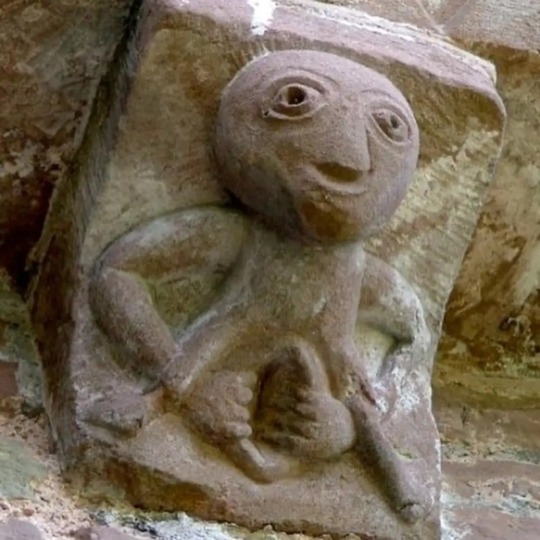
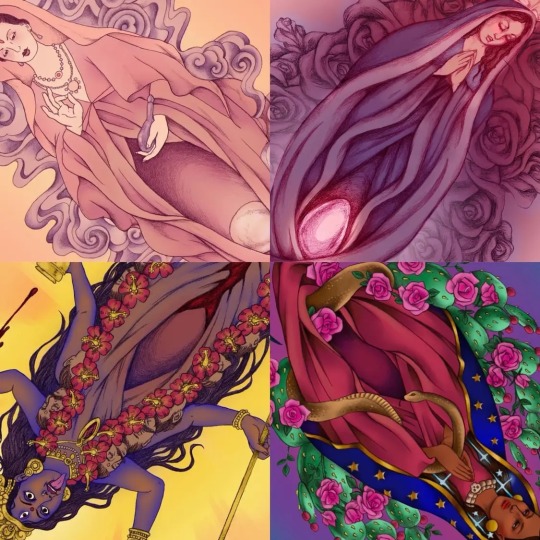
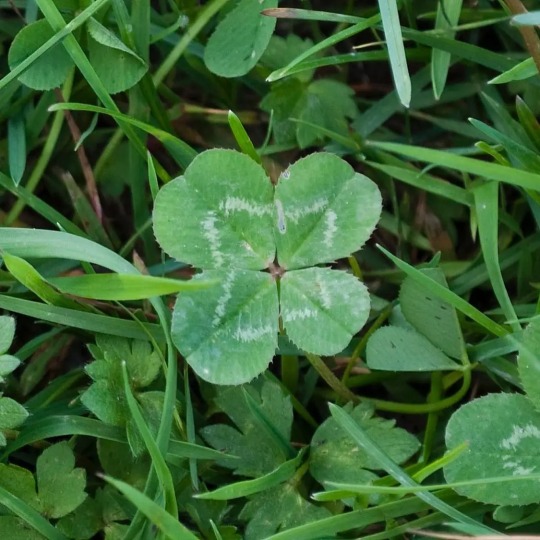
March 18th, Sheelah’s Day, is theorized to be the original indigenous holiday that St. Patrick’s Day was made to obscure. St. Patrick’s Day has become very successful at this. Historians agree on very little about the ancient origins of Sheelah’s Day, celebrated only in certain communities of the Irish diaspora in Canada and Australia for centuries now, suppressed upon the Isle of Erin. What most folklorists can agree on and trace is that the whiskey drinking and shamrocks associated with St. Patrick’s Day were most certainly originally part of Sheelah’s Day rituals. Where the common three leaf clover ☘️ is emphasized to represent the Catholic holy trinity in St. Patrick’s Day today, the significance of three leaves is debated on its meaning in Sheelah’s Day. Four leaf clovers being lucky seem to be tied to Sheelah’s Day celebrations. 🍀 But who is Sheelah? She herself has been obscured in oppression. Often denied simply because of modern prudence, by far the most likely answer to Sheelah’s identity is the notorious Sheela Na Gig. Although these sorts of statuaries are found throughout all pre Roman Britain architecture and elsewhere across ancient European ruins, this Irish Gaelic name has been assigned to these figures in association with a goddess whose own origin story has been effectively lost. She is known distinctively, and almost exclusively, by a huge exaggerated Vulva that she pulls up into the rest of her body. Because of the placements of these figures in architecture it is apparent that these sculptural Sheela Na Gigs were both wards and blessings. I realize how my own Vulva goddesses art are effectively modern Sheela Na Gigs.

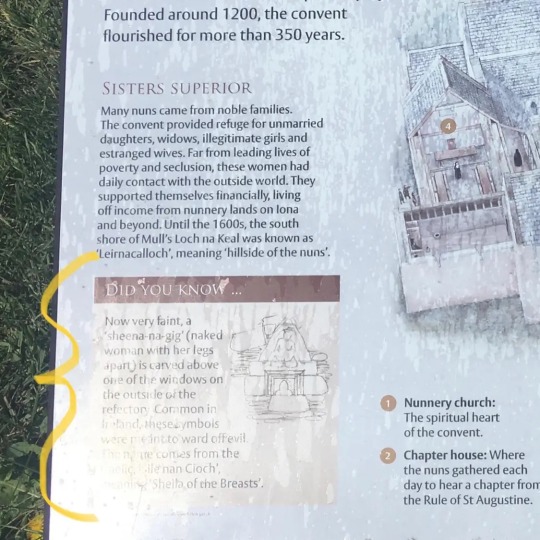
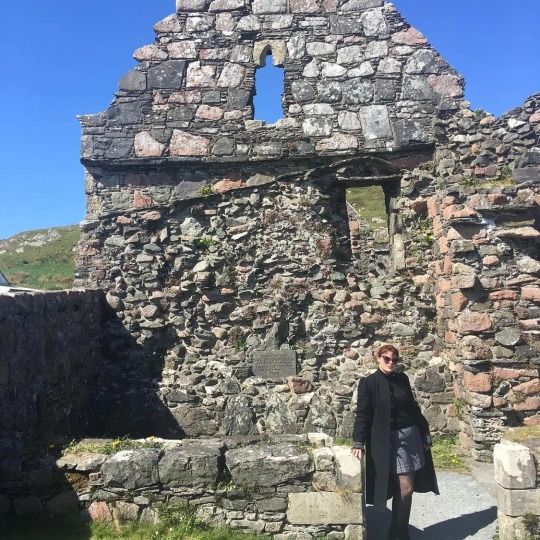
Slides:
1. Photo featured on Wikipedia article for “Sheela Na Gig” (12th century, on the church at Kilpeck, Herefordshire, England)
2. Photo collage of Vulva robed goddess art by PJ Superior
3. Four leaf clover 🍀
4. Photo I took of a badly weathered Sheela Na Gig during my honeymoon on the Isle of Iona, Scotland 🏴 2019
5. Photo of the plaque at the abbey ruins describing the Sheela Na Gig
6. Photo of myself standing in those same ruins
#sheela na gig#st patricks day#four leaf clover#pagan goddesses#irish diaspora#Sheela’s day#ancient origins#ancient ruins#scottish islands#travel#goddess art#weird history
1 note
·
View note
Text
https://courses.zinzeudo.com/courses/Working-With-The-Ancestors-101
Day 10 & 11 of Countdown To Working With The Ancestors 101. If you are interested in learning to work with spirits of the dead and ancestors, then check out my new class on working with the ancestors 101.
Today's post is about my great grandparents, on my paternal fathers side.
My great grandparents were born in Ireland. My great grandfather's name was Patrick McNeeley. He was born in 1894, and both of his parents died before he was 20 yrs old. I don't know where he was from in Ireland, but I do know that he and my great grandmother were together before coming to America and got married in ohio.
My great grandmother's name was Ella Theresa Treacy. She was born in Clogh, Cappalusk District, Galway county, Ireland, in 1894. When I look back at some of the records, I am confused because they say she was the head of household, but it also says married, not widowed or divorced? There are so many mysteries looking into my family's past. I did find something interesting when going through records from my family in Ireland. Apparently, close to where some of my family is from, there was a famous pirate queen named Grace O'Malley. The more I learn about my ancestors and my past, the more I grow. This statement is not true for everyone. Not everyone feels this way. Some people have a disconnect to their family and ancestry, and that's OK.
As I post these small descriptions of my family, I feel the power growing between me and them and their assistance in helping me with my daily life.
#ancestralwisdom #Ancestralmagic #ancestralveneration #streghe #stregheitaliane #irishwitch #irishfolkmagic #irishdiaspora #irishancestry #italianwitchcraft #italianmagic #italianimmigrants #italiandiaspora #italianancestry #Italianfolkmedicine #italianfolkmagic #irishfolkmedicine #samhain #halloweenmagic #halloween #irishmagic #janara #janare #catholicfolkmagic #folkwitch #folkmagic #spiritwork #ancestor
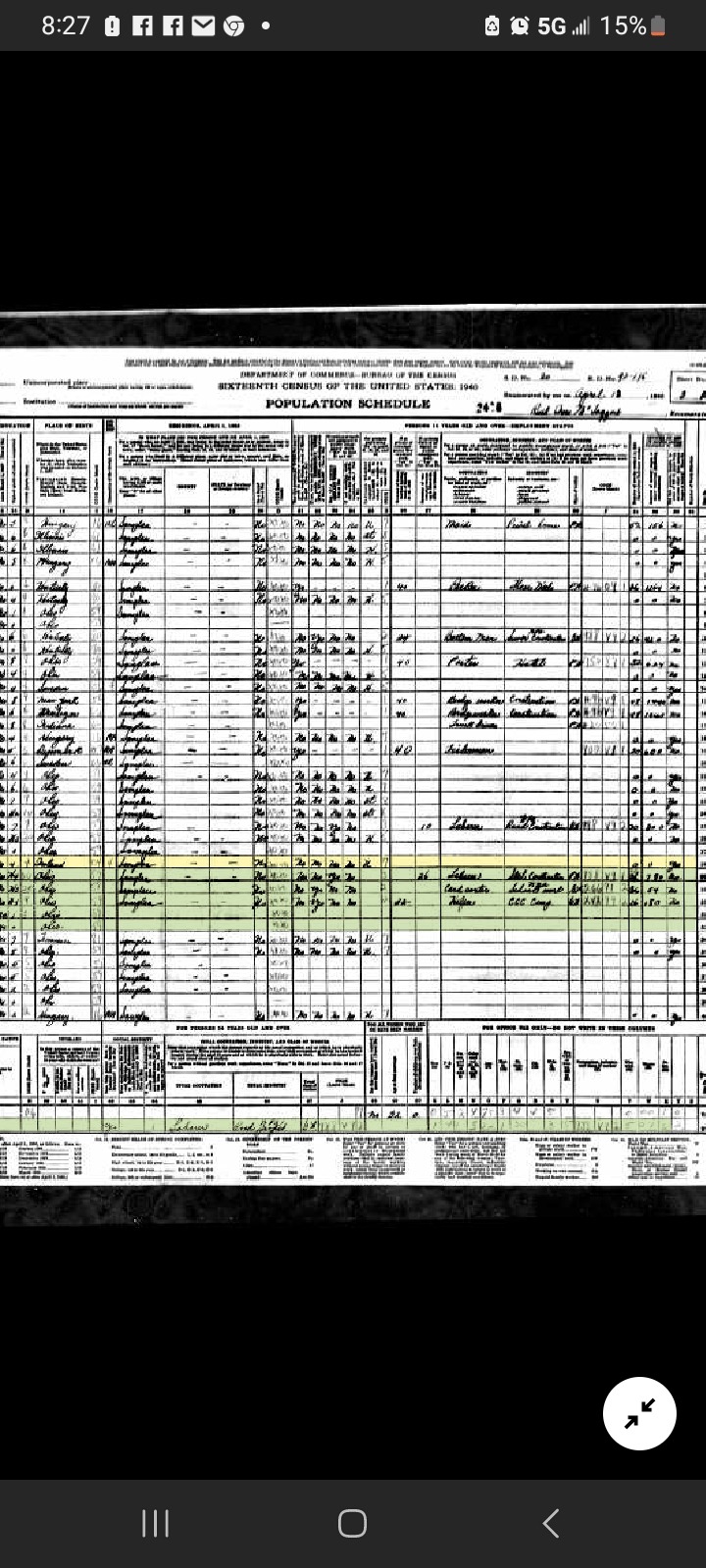
#folklore#italian folk magic#italian folk medicine#ancestors#ancestral healing#halloween#halloweenmagic#irish witch#irish witchcraft#samhain#spirituality#spirits#ancestral#ancestral magic#irish folk magic#witchcraft#paranormal#working with spirits#irish diaspora#catholic folk magic
2 notes
·
View notes
Text
Unstoppable force (wanting to reconnect with my ancestors' culture) vs immovable object (the urge to cry when I listen to song in Irish)
#they're so pretty and I don't know what they're saying and if it's even slightly sad it's hits me right in the feels#irish diaspora#rambles
4 notes
·
View notes
Text
Dia dhaoibh! My sister gave me a copy of Jp McMahon's The Irish Cookbook for Christmas so I figured I would share my attempts to cook through it and use this blog as a way to motivate me to actually cook and as an excuse to practice my very very basic Irish.
I'll be posting about the recipes, my reflections on reconnecting to my Irish heritage, my opinions on Irish politics, and assorted Irish diaspora content.
Stay tuned for my first recipe attempt later today!
16 notes
·
View notes
Text
i think i really want to connect more to my irish ancestry, maybe go back to learning irish to start... and figure out if i have jewish ancestry as well. like my (catholic, and irish/german/french) grandmother very undeniably had some customs that are reminiscent of jewish ones. i know it doesn't make me jewish, but i feel such a confusion and desire to know the story. my guess is that someone jewish married in at some point (i have not found evidence of this), or it's a forced conversion thing which... if it is, i may never find record of it at all. which is just great /s
i really should talk to my grandmother's siblings before they die too.
#julian rants#irish#family history#irish diaspora#jewish#<- please let me know if i shouldnt use that tag
20 notes
·
View notes
Text
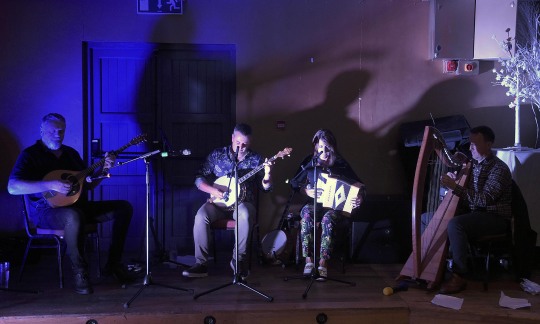
Brian Fitzgerald launching his CD at Bulgaden Castle, Bulgaden, Co Limerick this week.
#Fleadh Cheoil#irish mythology#irish heritage#irishamerican#lough Gur#irish diaspora#limerick#irish music#banjo player#traditional music
2 notes
·
View notes
Video
youtube
Carrowroe Williamstown Co Galway
#youtube#ireland#Knock#rural life#bungalow#land#Salthill Beach#galway university#builders#popular#for sale#Property Developers#Irish Diaspora#Bargain
2 notes
·
View notes
Text
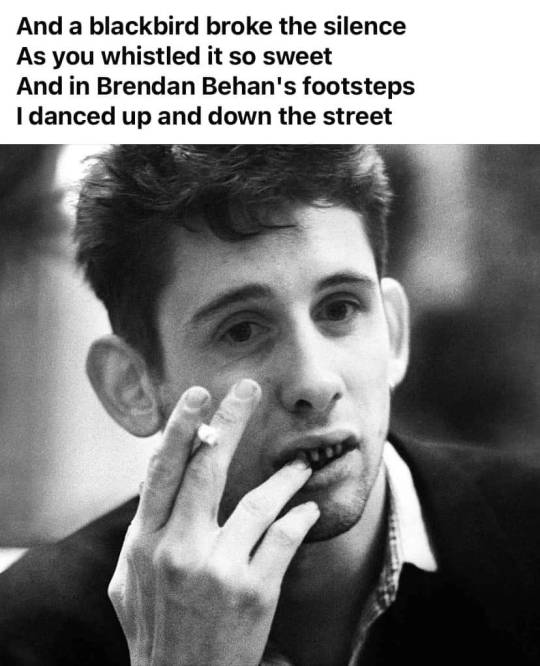
5 notes
·
View notes